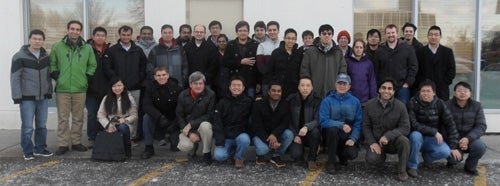Members of the Water Institute at the University of Waterloo are always looking for new ways to solve complex water problems facing the world today. Norman Zhou, Canada Research Chair in Advanced Materials Joining and Processing, Water Institute member and professor in Waterloo’s Department of Mechanical and Mechatronics Engineering, is leading a research group that’s using an interdisciplinary approach to address some of these problems. The Centre of Advanced Materials Joining (CAMJ) research group is developing applications using nanomaterials and additive manufacturing (3D printing) to address problems like micropollutants in water, soil moisture management and aquaculture disease management. They are developing material processes for the synthesis of photocatalytic nanomaterials, 3D-printed porous architectures, and electrospun nano-membranes.

“Our water treatment group at the CAMJ hopes that the technologies we are developing will be implemented as point-of-source and point-of-entry treatment systems in industries such as pharmaceutical and aquaculture, as well as in rural communities,” said Zhou.
One of the research group’s breakthrough technologies has been the development of a moisture-driven electrical generator that uses the flow of water in titanium dioxide nanowire networks to generate power when exposed to a highly moist environment – a technology that can be used for environmental monitoring such as measuring moisture levels in soil.
“Most state‐of‐the‐art electronic sensors are powered by batteries that require regular charging and eventual replacement which can cause environmental issues and complex management problems,” said PhD Candidate and Research Manager of CAMJ, Robert Liang. “This new type of device has been successfully developed as a self‐powered, flexible sensor – a break-through innovation for moisture‐induced‐electricity technology.”
Zhou and Liang contribute much of CAMJ’s success to interdisciplinary collaboration with on-campus and off-campus partners. The research group has collaborated with Water Institute member and professor in Waterloo’s Department of Biology, Mark Servos, to run water quality assessments of micropollutants in water such as pharmaceuticals and personal care products, as well as professor Susan Andrew’s Drinking Water Treatment Group at the University of Toronto that focuses on disinfection by-products in water.
“Interdisciplinary teams are important when tackling issues in the water sector because water is used in every industry and community,” said Liang. “Our collaborations have allowed us to utilize advances in each field and cross-pollinate ideas to produce innovative approaches to treat emerging problems in water.”
CAMJ is always looking for graduate students and potential collaborations. If interested please contact:
Research Manager: Robert Liang (rliang@uwaterloo.ca)
CAMJ Director: Norman Zhou (nzhou@uwaterloo.ca)